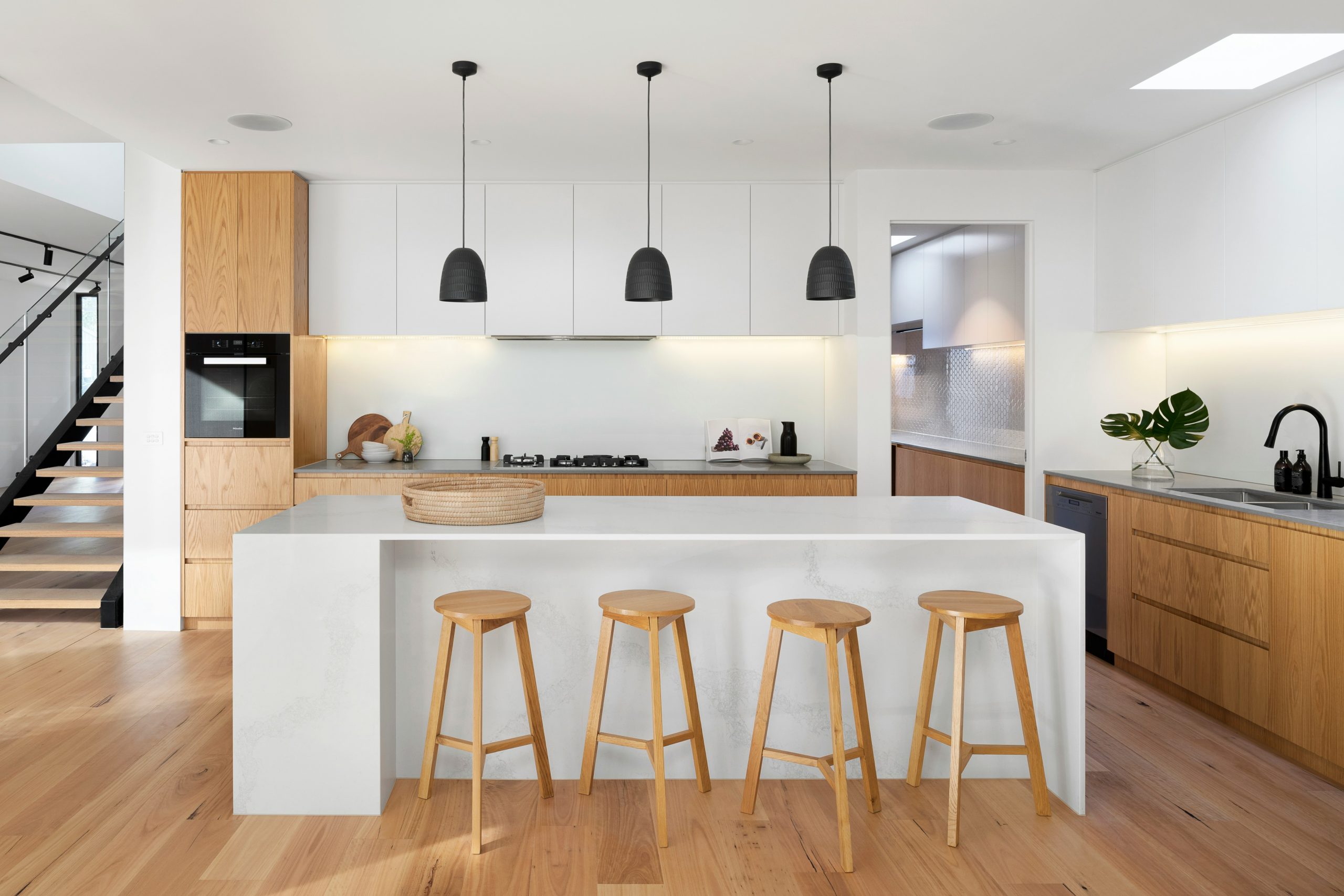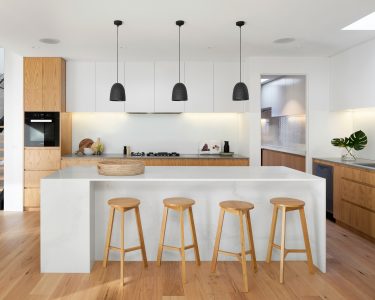Kitchen remodeling in New Jersey is one of the most valuable home upgrades you can make. Updated, open-concept kitchens are a top priority for buyers across the state. But, there’s a lot of money in New Jersey, so NJ kitchen renovations comes with high expectations and square footage challenges.
Those challenges can lead to kitchen remodel mistakes like rushed planning, poor layout choices, or underestimating how much it’ll cost. That can derail timelines, blow budgets, and leave you with a space that doesn’t meet your needs.
Even worse, these missteps can lower your home’s resale value or lead to costly fixes down the line. Avoiding them from the start can save you time, money, and stress. It’ll also help you get the kitchen you actually want.
What Are the Most Common Mistakes in Kitchen Remodeling?
From layout oversights to poor planning, common mistakes like these often result in kitchens that look nice but don’t work well for daily use.
Below are some of the most frequent problems and how to avoid them.
1. Ignoring the Kitchen Triangle
What is the kitchen triangle?
The kitchen triangle refers to the layout strategy of placing the sink, stove, and refrigerator in a triangular formation to maximize efficiency and reduce wasted motion while cooking. This is one of the most important principles of the best kitchen layout for small spaces.
Without a kitchen triangle, homeowners often end up with awkward workflows. They could be walking across the room with a pot of boiling water or reaching over the stove to access the fridge. A kitchen contractor in New Jersey can help you design a kitchen that follows this tried-and-true concept.
This issue is especially common in NJ homes with older or unconventional layouts. Remodeling without rethinking the work triangle can make your brand-new kitchen that’s harder to use than the old one. Even in small kitchens, repositioning one appliance or adding a prep sink can improve efficiency.
2. Choosing Looks Over Function
Prioritizing visual trends without thinking about how you’ll actually use the kitchen is a major kitchen remodel mistake. Open shelving might look great online, but it doesn’t offer the same storage capacity as full cabinetry. A waterfall island may be eye-catching, but not if it blocks access to your dishwasher or pantry.
Focusing on appearance without function leads to daily frustrations. You might run out of storage or find yourself constantly wiping fingerprints.. Always focus on functional design first, and build aesthetic choices around it.
3. Skipping Professional Guidance
Attempting a kitchen remodeling in New Jersey project without professional input is risky. Older homes often present unexpected plumbing, structural, or permitting challenges. Don’t just rely on online inspiration or DIY tutorials. Placing too much trust in them can lead to overlooked safety codes, poor space planning, and budget overruns.
Hiring a licensed kitchen contractor in New Jersey early on helps you avoid major setbacks. They can identify issues hidden behind walls, secure the right permits, and coordinate skilled labor. Without expert help, it’s easy to miss critical details that affect the long-term performance of your new kitchen.
Why Is Budget Mismanagement So Common?
Kitchen remodeling costs can stack up quickly, especially when labor, permits, and material prices often run higher than expected. Many homeowners underestimate kitchen remodel costs or spend too much in the wrong areas.
Here’s where things usually go wrong and how to avoid financial stress during your project.
4. Failing to Plan for Hidden Costs
Why do kitchen remodels go over budget?
Kitchen remodel budgets in NJ often go over due to hidden issues like subfloor rot, mold, plumbing upgrades, and permit delays. Always build a 10–20% buffer into your budget. This way, your budget can absorb surprises without derailing the project.
Behind every wall or under every floorboard, there could be outdated wiring, water damage, or code violations. Each of those must be addressed before work can continue. These surprises are more common in older homes throughout Essex and Union counties. Planning for them from the start keeps your NJ kitchen renovation from stalling mid-project.
5. Spending Too Much on Trends
It’s tempting to splurge on stylish light fixtures, colored cabinets, or smart appliances. But the hottest design trends today may look outdated in just a few years.
Often, trendy choices add little to long-term value, especially if they reduce functionality. Focus your budget on foundational upgrades. You’ll get more durability, better resale value, and fewer regrets later on that way. Flashy features should only come after the essentials are covered.
How Can Poor Layout Choices Affect Daily Use?
A beautiful kitchen still needs to work well day in and day out. When layout mistakes go uncorrected, even high-end finishes and appliances won’t fix daily frustrations. Poor design choices often interfere with movement, storage, and accessibility. Sure, the space looks good, but feels clumsy and inefficient.
6. Overcrowding the Space
Kitchens often become multi-use spaces: for cooking, working, gathering, and entertaining. But adding too many features can make the space feel cramped and inefficient.
This is a common issue when trying to squeeze big ideas into tight New Jersey homes. If there’s not enough space between appliances, cabinets, and walkways, traffic gets blocked and prep zones become unusable. A good layout balances features with breathing room so the kitchen feels open, not jammed.
7. Lack of Storage Planning
Storage is one of the most overlooked aspects of kitchen design. A layout that looks great on paper might not account for large pots, pantry staples, or small appliances.
Many homeowners realize too late that they have nowhere to store their air fryer, baking trays, or dry goods. Clutter builds up without pull-out shelves, full-height cabinets, or built-in organizers. Account for storage in every part of the design to make your kitchen easier to live in and keep clean.
What Happens When Lighting Gets Overlooked?
Lighting plays a major role in the appearance and functionality of a kitchen. Yet many kitchen remodeling in New Jersey projects treat it as an afterthought. That causes dark prep areas, harsh shadows, or a lack of ambiance. Good lighting is layered and purposeful. Skipping this step can leave an otherwise stunning kitchen feeling incomplete.
8. Relying Solely on Overhead Lighting
Why is task lighting important in kitchens?
Task lighting is essential in kitchen remodeling because it illuminates work areas and improves safety. It also creates a warmer, more welcoming space.
Overhead fixtures can’t provide the focused light you need for chopping, reading recipes, or washing dishes by themselves. Without extra lighting under cabinets or over islands, you end up working in your own shadow. A balanced lighting plan should combine ambient, task, and accent lighting to make the space practical and pleasant to use.
What Are the Dangers of Poor Material Selection?
Even with a solid layout and efficient lighting, poor material choices can lead to long-term regret. Kitchen surfaces endure daily wear and tear, so the cheapest options will wear down quickly. The wrong materials may look great at first, but won’t stand up to years of spills, scrubbing, and use.
9. Choosing Low-Quality Countertops
Not all countertop materials hold up under daily use. Low-grade laminate or poorly sealed stone can stain, crack, or warp over time.
Choosing materials like quartz, granite, or butcher block ensures your counters stay attractive and functional. In New Jersey’s busy suburban households, durability matters. A professional kitchen contractor in New Jersey can help you select surfaces that meet your style preferences.
While premium materials cost more upfront, they usually need less maintenance and won’t need replacement a few years. Plus, higher-end countertops improve resale appeal. Buyers in towns like Millburn and Livingston often expect quality finishes. They may hesitate if they see visibly worn or dated surfaces.
10. Skimping on Cabinets and Hardware
Your cabinets and drawers take daily abuse. Thin materials, weak hinges, and mass-produced parts are more likely to sag, warp, or come loose over time.
Quality cabinets with sturdy box construction, full-extension drawers, and soft-close hinges make a big difference in functionality and longevity. Investing in better hardware and materials may cost more upfront. But, they’re less likely to need replacement or repair in a few short years. Well-built cabinets also improve kitchen organization, making it easier to keep the space clean and clutter-free.
Over time, durable cabinetry holds its shape, resists warping, and keeps doors aligned. That consistency adds to the feel of a high-end, well-maintained kitchen.
How Can Homeowners Avoid These Remodeling Mistakes?
Avoiding common kitchen remodel mistakes doesn’t need a perfect plan. It just takes the right approach from the beginning. Working with experienced professionals, setting a clear budget, and focusing on long-term function over short-term trends can make your kitchen remodeling in New Jersey far smoother and more rewarding.
Practical Tips for a Smoother Kitchen Remodel
- Start with a clear plan – Outline how you use your kitchen, what you dislike about the current space, and what your goals are. This helps your kitchen contractor New Jersey create a design that meets your functional needs instead of relying solely on surface-level upgrades.
- Set a realistic budget – Include a 10–20% cushion for unexpected costs like water damage, electrical upgrades, or permit fees. Kitchen remodels in New Jersey often uncover hidden issues, so this buffer keeps your project from stalling or requiring last-minute compromises.
- Hire a licensed New Jersey general contractor – Local contractors understand township codes, kitchen renovation permits NJ processes, and structural quirks of NJ homes. They can also guide you toward materials and layouts that perform well in our climate and housing stock.
- Focus on layout and storage – A sleek design means little if your pots don’t fit in the cabinets or your fridge blocks the oven door. Making layout and functionality your top priorities ensures daily tasks feel smooth.
- Communicate frequently with your contractor – Schedule check-ins at key milestones to approve layouts, material selections, and installations. This prevents misunderstandings and allows you to course-correct before major errors happen.
Step-by-Step Kitchen Remodel Planning Guide for New Jersey
Phase 1: Initial Planning and Goal Setting
- Define your kitchen remodeling goals Think about how you cook, clean, store, and entertain in the space. Clear goals keep your design focused and help you make smart trade-offs when budget decisions arise. Consider the best kitchen layout for small spaces if you’re working with limited square footage.
- Research kitchen remodel timeline New Jersey expectations Most NJ kitchen renovations take 6-12 weeks depending on scope and permit processing. Factor in seasonal considerations and contractor availability when planning your start date.
- Determine how much does kitchen remodel cost NJ for your scope Basic remodels start around $25,000-$50,000, while high-end projects can exceed $100,000. Research current material and labor costs in your specific New Jersey county.
Phase 2: Design and Professional Selection
- Gather design inspiration and style preferences Collect photos, design ideas, or showroom samples that reflect your style. Sharing this vision with your New Jersey kitchen contractor helps them recommend finishes and layouts that align with your taste.
- Interview and select licensed NJ kitchen contractors Request quotes from at least three licensed contractors with experience in kitchen remodeling in New Jersey. Look for experience with kitchens like yours and check references from recent projects.
- Finish your layout focusing on the kitchen work triangle Don’t wait until demolition begins to pick cabinets or lighting. Focus on the best kitchen layout for small spaces if needed, ensuring efficient workflow between sink, stove, and refrigerator.
Phase 3: Permits and Material Selection
- Secure necessary kitchen renovation permits NJ Permits are required for plumbing, electrical, and structural work in most NJ towns. Your contractor should handle this process, but verify permits are pulled before work begins.
- Select materials with durability in mind Lock in cabinet styles, countertop materials, flooring, and lighting fixtures early. This helps avoid delays, backorders, and rushed decisions that lead to regret.
- Create a detailed project timeline Work with your kitchen contractor New Jersey to establish milestones for demolition, rough-in work, installation, and final details. Build in buffer time for potential delays.
Phase 4: Construction and Project Management
- Prepare your home for construction Set up a temporary kitchen space and protect adjacent rooms from dust and debris. Communicate with neighbors about noise and contractor parking.
- Track construction progress regularly Drop by regularly or schedule walkthroughs with your contractor to stay involved. You’ll catch kitchen remodel mistakes faster and feel more confident in how the project is unfolding.
- Complete final walkthrough and punch list Create a punch list of any issues, like misaligned cabinet doors or missing outlet covers, before signing off. This ensures everything is complete, functional, and up to your standards before the job wraps up.
FAQ: New Jersey Kitchen Remodeling Mistakes
What should I not do during a kitchen remodel?
Avoid rushing the process, skipping kitchen renovation permits NJ, or cutting corners on materials. These shortcuts often lead to long-term issues like unsafe installations, wasted space, or a kitchen that looks dated.
Is open-concept a good idea for NJ homes?
Yes. Open-concept kitchens are popular in many NJ towns and work especially well in homes where space and light are limited. Removing walls or reworking layouts can dramatically improve flow between the kitchen, dining, and living areas.
How long does a typical kitchen remodel take?
A full kitchen remodel timeline in New Jersey usually takes 6–12 weeks depending on scope, material availability, and permit processing times. Starting with a clear plan and working with an experienced kitchen contractor New Jersey helps avoid unnecessary delays.
Should I remodel before selling?
If your kitchen is outdated, cramped, or poorly laid out, a kitchen remodeling New Jersey project can significantly improve resale value and market appeal. Even modest updates can make your home more competitive.
Avoiding Mistakes Leads to a Dream Kitchen
Kitchen remodeling New Jersey is a big investment, but it doesn’t have to be a risky one. When you take the time to plan carefully, focus on function over trends, and work with a skilled kitchen contractor in New Jersey, you dramatically reduce the chances of costly kitchen remodel mistakes.
A successful NJ kitchen renovation doesn’t just give you a beautiful new space. It creates a kitchen that works better for your lifestyle, adds long-term value to your home, and makes everyday tasks more enjoyable. Whether you’re renovating a historic kitchen in Maplewood or reworking a tight layout in West Orange, the right decisions now will pay off for years to come.




